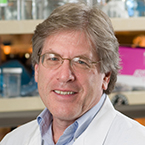
A research pioneer who has changed the way the mechanics of the cell cycle and the genesis of cancer are viewed, Dr. Sherr’s breakthroughs have led to methods for molecularly targeting and attacking tumor growth. His discoveries of two major tumor suppressive pathways that, when mutated, result in human cancer, offer promise of new therapies designed to make cells more sensitive to the many conventional forms of anti-cancer therapy that act by damaging the DNA of tumor cells.
A visit to the laboratory of Nobel Laureate Harold Varmus in 1975 encouraged Dr. Sherr to study retroviral oncogenes and to investigate how their normal cellular counterparts control cell proliferation. His subsequent discoveries of the receptor for colony-stimulating factor-1 (FMS oncogene), D-type cyclins, cyclin-dependent kinase-4 (CDK4), several polypeptide CDK inhibitors, and the ARF tumor suppressor helped to reveal how mammalian cells respond to extracellular cues in regulating their cell division cycle. Many such growth regulatory genes are used by clinicians today for the diagnosis and targeted treatments of different cancers. Dr. Sherr is currently studying the activity of particular tumor suppressors in governing cell line establishment, senescence, stem cell biology, and protecting against oncogenic insults.
Career Highlights
2019 Memorial Sloan Kettering Chester Stock Award for Cancer Research
2013 Elected Member, American Academy of Arts & Sciences
2013 Italian-American Cancer Research Foundation Prize
2010 Elected Fellow, American Association for the Advancement of Science
2004 Elected Member, Institute of Medicine
2004 Charles S. Mott Prize, General Motors Cancer Research Foundation
2003 AACR-Kirk A. Landon Prize for Basic Cancer Research
2000 Bristol Myers-Squibb Achievement Award for Basic Cancer Research
2000 Pezcoller Foundation-AACR International Award in Cancer Research
2000 Ernst W. Bertner Award for Cancer Research, MD Anderson Cancer Center
1995 Elected Member, National Academy of Sciences, Washington, DC
1994 Elected Fellow, American Society for Microbiology
1991 Elected Member, American Association of Physicians
1989 Milken Family Award for Basic Cancer Biology
1987 Damashek Prize, American Association of Hematology
1986 Elected Member, American Society for Clinical Investigation
1972 MD, New York University School of Medicine
1972 PhD, New York University Graduate School of Arts and Sciences